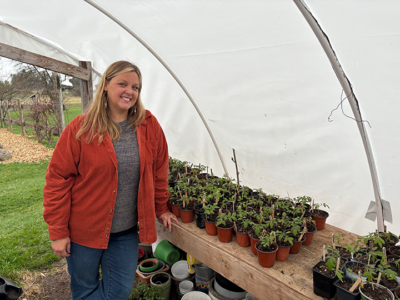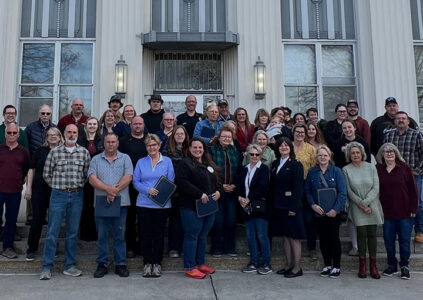Mental health help offered to emergency workers

Courtesy Photo Abby Steinke and Ashley Beaubien, registered nurses at MidMichigan Medical Center-Alpena, are among those putting their mental health on the line as they help area residents fight COVID-19.
ALPENA — Nurses and paramedics, even in the best of times, have high-stress jobs.
A pandemic makes it worse.
One Alpena agency is trying to help.
Registered nurses Abby Steinke and Ashley Beaubien, pausing during a recent shift at MidMichigan Medical Center-Alpena, described working in a medical facility during the crisis.
Patients are nervous, they said. Those without the sickness ask frequently if it’s anywhere near them — in their wing, in their roommate.
Those patients who have tested positive — who are kept in a separate hallway, minimizing the possibility that the virus will spread to other hallways — are anxious about their health and afraid for their families, who may have been exposed.
Nurses, with their own set of stresses, spend extra time in COVID-19 rooms — where a sneeze can be dangerous — performing blood transfusions, providing oxygen and respiratory care, and tending to other higher-level needs.
Even gowning up to go into those rooms takes extra time, said Steinke, who takes care of the majority of patients who are awaiting test results or who have tested positive.
“Not a lot of people know what we’re going through,” Steinke said.
That’s why Catholic Human Services decided to waive all out-of-pocket copays for mental health services for medical employees, paramedics, firefighters, law enforcement, and other essential workers. The remaining cost of treatment can usually be billed to insurance, removing the financial barrier that may keep someone from seeking mental health treatment.
Meanwhile, the virus continues to spread in Northeast Michigan, although more slowly.
District Health Department No. 4 announced one more Alpena County resident is confirmed infected with the coronavirus.
That means 108 Northeast Michigan residents have been confirmed infected with COVID-19, the disease caused by the coronavirus, including 88 Alpena County residents, 11 Presque Isle County residents, five Montmorency county residents, and four Alcona County residents. Eight infected Alpena County residents and one infected Alcona County resident have died.
“We recognize and thank residents that continue to follow the guidelines outlined in (Gov. Gretchen) Whitmer’s latest executive orders,” Health Department spokeswoman Cathy Goike said in a statement. “We still need to be vigilant and wear face coverings in public and limit our trips to essential needs.”
Meanwhile, public health officials on Tuesday advised those who shopped at the Alpena Walmart from 8 p.m. to close on May 4 or the Auto Value in Oscoda Township in the late afternoon on May 2 to monitor for symptoms of COVID-19, because a person known to be infected was in those places at those times.
‘IT IS SCARY TIMES’
The Alpena hospital has taken a multitude of safety precautions, from a morning huddle offering COVID-19 procedural updates to using a plastic covering during intubations to keep patient fluids from spraying nurses’ faces.
They practice, rehearsing what would happen if a COVID patient would go into cardiac or respiratory arrest.
Still, some worries get carried home, like the scrubs thrown in the wash before the nurses greet their families.
Beaubien, pregnant with twins, doesn’t work in the COVID hallway. Her husband is still concerned for her safety.
“We’re definitely using Lysol a lot at my house,” the nurse said.
It’s an anxious time, especially if someone struggles with anxiety to begin with, Steinke said.
“Our job is super-critical,” Steinke said. “Even though it is scary times, it’s our job. This is what we’re here for.”
Hospital workers, paramedics, and other people who work in crisis response always face physical risk. Right now, their exposure to the coronavirus poses a psychological risk, as well, said Larry LaCross, clinical supervisor at Catholic Human Services in Alpena.
Being in a constant state of vigilance takes its toll, emotionally. Even more harmful to the psyche, said LaCross, is the feeling of helplessness that comes from seeing people who are sick and having limited options to help them.
Recent suicides of a doctor and a paramedic in New York drove home the urgency of providing help for people caring for people exposed to those sick with COVID-19, LaCross said.
‘ON THE BACK BURNER’
After weeks of only seeing his kids through a window, paramedic Caleb Borchard misses his therapy sessions.
The Alpena firefighter started seeing a therapist a year ago, pre-coronavirus. The job, he said, is stressful enough, without a pandemic thrown in.
Now, on top of working with the ill and injured, not knowing if he’s exposing himself to something deadly, Borchard has to worry about bringing something home to his family.
Concerned about the safety of his 3-year-old and 8-month-old sons, he decided to self-isolate at one end of his house. For a long time, he would only see them out a window as they played in the yard, only hear them as they asked his wife — her hands full with two little ones and her own worries as she tries to figure out how to save her small business that’s been closed by state order — why daddy couldn’t watch cartoons with them or put them to bed.
Kids don’t usually get sick from COVID-19, he knows, but, as a medical worker who could bring home illness, he worries that they’ll pick up something else and not be able to safely seek medical care if the hospital is flooded with COVID patients.
He used to be able to leave his work at work. Now, there’s always worry in the back of his mind, Borchard said.
Everyone in his profession should have at least an annual psychological screening, Borchard thinks. He’s recommended counseling to several coworkers, and wonders why the anxiety and fear that can accompany a frontline job doesn’t lead more people to seek mental health treatment.
A phone session with his therapist after offices were closed didn’t go well, and the paramedic hasn’t had a session since. He may try teletherapy, he said, as soon as he has time.
“We always put our mental health on the back burner,” Borchard said.
Get help
To request mental health counseling from Catholic Human Services, call 989-356-6385. An intake coordinator will provide guidance to match the client with the appropriate form of assistance.




